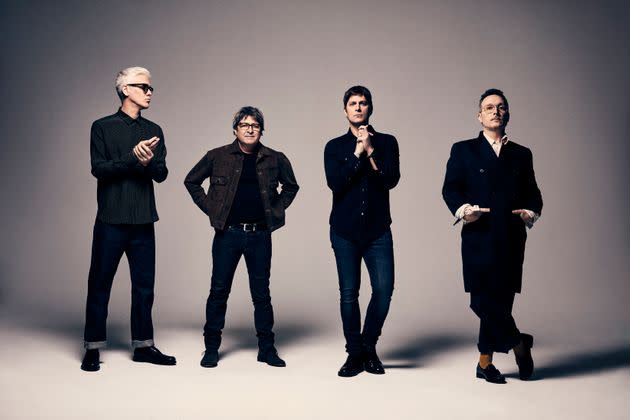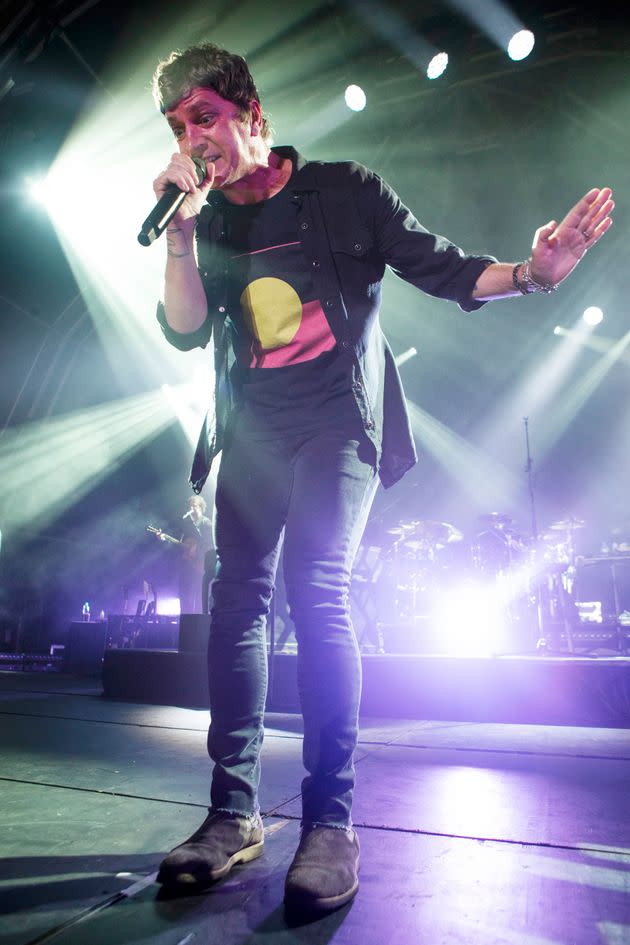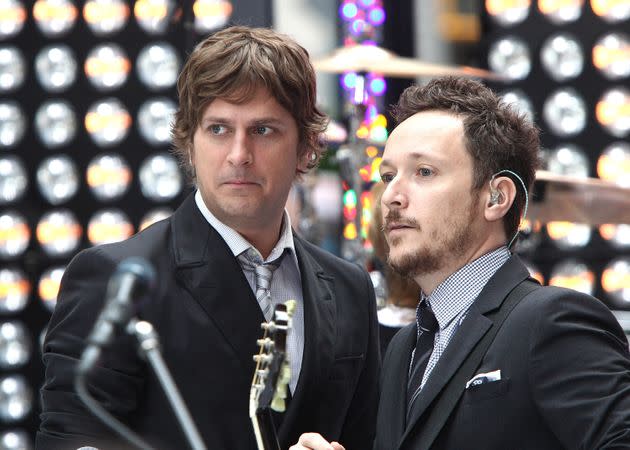After 11 Years, Matchbox Twenty Is Back And Done With ‘Manufactured Angst’
When Matchbox Twenty returned to the studio to record its first studio album in 11 years, lead singer Rob Thomas and his band mates had a few stipulations.
“We didn’t want to make a record about all the negative sides of the past few years, especially when there’s been so much positive that’s been going on,” Thomas told HuffPost. “We didn’t want to talk about the isolation. We didn’t want to talk about the division. We didn’t want to talk about rage.”
He went on to note: “There’s so much joy and so much looking to the future that’s happening right now as we speak. So we started gravitating toward songs that were about that. That’s the record we wanted to make.”
Released last week, “Where the Light Goes” finds Thomas, guitarist Kyle Cook, drummer and rhythm guitarist Paul Doucette and bassist Brian Yale in both reflective and celebratory mode. The result is a thoughtful collection of songs that doesn’t dwell on sonic nostalgia but will nonetheless thrill the band’s longtime fans.

After 11 years, Matchbox Twenty is back with their new album, "Where the Light Goes."
Songs like “Hang on Every Word” and “Queen of New York City” are thoughtful musings on marriage and fatherhood. Other tracks ― notably the anthemic first single, “Wild Dogs (Running in a Slow Dream)” ― will remind listeners that the band hasn’t lost the youthful sense of abandon it embraced on 1996’s “3AM,” 1998’s “Unwell” and 2000’s “If You’re Gone,” among other beloved hits.
HuffPost caught up with Doucette and Thomas shortly before Matchbox Twenty embarked on its Slow Dream Tour, which kicked off last month in Vancouver, Canada, and will hit Houston, Nashville, Toronto and other North American cities before wrapping Aug. 6 in Tinley Park, Illinois. The two musicians shared their thoughts on returning to the studio after more than a decade, their current tour and why looking to the past isn’t always a bad thing when it comes to rock music.
Talk to me about the creative genesis of “Where the Light Goes,” Matchbox Twenty’s first new studio album in 11 years.
Paul Doucette: We were going to tour in 2020 and obviously the COVID-19 pandemic had other plans. 2021 came, still no tour. 2022 came, and … there was a general sense that we were letting people down. Prior to that point, there had been conversations about doing a new song or two. I was busy doing other stuff, so I was like: “You guys go ahead and do that, and I’ll see you on the road.”
So when our 2022 tour got canceled and [Cook] was like, “Let’s do a record,” I thought, “OK, I’m into that.” Once we made the final decision to do it, it all came together quickly.

"There are songs on the album about love, loss and the dark side of relationships, but for the most part, I don’t think there’s anything that’s been done with any sort of cynicism," Rob Thomas said.
Rob, you’ve said repeatedly that you had no interest in making a “pandemic album.” Why was that distinction important to you?
Rob Thomas: We were never, like, we’re going to make this kind of record or that kind of record. But there’s enough cynicism in the world right now. There are songs on the album about love, loss and the dark side of relationships, but for the most part, I don’t think there’s anything that’s been done with any sort of cynicism.
When you come from a 1990s rock band — a ’90s alt-rock band, which is what we were when we started — you realize that a lot of what you’ve done in the past is manufactured angst. At the time, you feel like it’s real, but when you go back and listen to it, you’re like: “Wow, I wasn’t really that angry. This is what I felt I was supposed to be doing.” As we’ve gotten older, we don’t have that in our tank anymore.
We’re thrilled to see Matchbox Twenty back onstage this summer for the first time since 2017’s A Brief History of Everything Tour. What can we expect from the new shows?
Thomas: I can say truthfully that there are certain songs from our first record [1996’s “Yourself or Someone Like You”] that I’m OK if I never hear again. But I love playing them every night because the experience of sharing them is different. It’s new every night. We’re fortunate enough to have [27 years] of music to be able to draw from. That’s a really, really good problem to have.

"I’ve hit a point in my life where I’m exhausted by anger," Paul Doucette (right, with Thomas) said of Matchbox Twenty's new album. "I’m exhausted by rage and by conflict, so I’m just, like, can we just take a minute?"
Rob, you’ve had great success as a solo artist with 1999’s “Smooth” with Carlos Santana and 2005’s “Lonely No More.” Your last album, 2019’s “Chip Tooth Smile,” was an incredible 1980s throwback. Do you make any distinction between the music you write for yourself as a solo artist versus the music you write for Matchbox Twenty?
Thomas: The difference between a solo song and a Matchbox song that I write is just that a Matchbox song is a song that the guys like. That’s the only difference. When I write a song, I have to believe in it when I sing it, so I just do a bunch of those when I’m writing, and if the guys like them, they wind up on a record.
The more interesting thing is that Paul has written four or five songs that I’ve felt that connection with. In 30 years, Paul’s the only person who [has ever written] me an entire song on multiple occasions.
Doucette: There’s a song on this album called “Hang on Every Word,” which I wrote for my daughter [Mathilda Plum, 18]. And Rob sings it in a way that feels genuine, even to me. That’s an amazing superpower to have. To have someone take your songs to that level is a gift.
Watch Matchbox Twenty’s video for “Don’t Get Me Wrong,” from “Where the Light Goes,” below:
What would you most like listeners to take away from “Where the Light Goes”?
Doucette: I just want people to listen to it and feel good about themselves. I’ve hit a point in my life where I’m exhausted by anger. I’m exhausted by rage and by conflict, so I’m just, like, can we just take a minute?
If the record can provide even a little bit of that, if the tour can provide that for a night for somebody — that’s all I want. If we get that, then check.
Thomas: You have no control over anything other than your motive, your intention, your purpose and everything that you put in. But I really love this record. I’m really proud of this record, and I can’t wait for people to hear it. That’s a victory in itself right there.
This interview has been lightly edited and condensed.

 Yahoo Sports
Yahoo Sports 